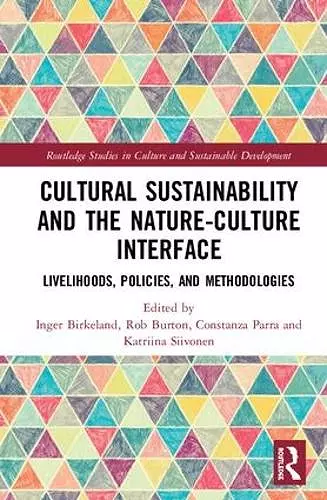Cultural Sustainability and the Nature-Culture Interface
Livelihoods, Policies, and Methodologies
Rob Burton editor Constanza Parra editor Inger Birkeland editor Katriina Siivonen editor
Format:Hardback
Publisher:Taylor & Francis Ltd
Published:21st Mar '18
Currently unavailable, and unfortunately no date known when it will be back
This hardback is available in another edition too:
- Paperback£43.99(9780367855796)

As contemporary socio-ecological challenges such as climate change and biodiversity preservation have become more important, the three pillars concept has increasingly been used in planning and policy circles as a framework for analysis and action. However, the issue of how culture influences sustainability is still an underexplored theme. Understanding how culture can act as a resource to promote sustainability, rather than a barrier, is the key to the development of cultural sustainability.
This book explores the interfaces between nature and culture through the perspective of cultural sustainability. A cultural perspective on environmental sustainability enables a renewal of sustainability discourse and practices across rural and urban landscapes, natural and cultural systems, stressing heterogeneity and complexity. The book focuses on the nature-culture interface conceptualised as a place where experiences, practices, policies, ideas and knowledge meet, are negotiated, discussed and resolved. Rather than looking for lost unities, or an imaginary view of harmonious relationships between humans and nature based in the past, it explores cases of interfaces that are context-sensitive and which consciously convey the problems of scale and time.
While calling attention to a cultural or ‘culturalised’ view of the sustainability debate, this book questions the radical nature-culture dualism dominating positive modern thinking as well as its underlying view of nature as pre-given and independent from human life.
"How does sustainability translate into different cultures? Is it a property of all cultures and, if so, how do we come to understand sustainability when culture is the prism through which we understand everything? This volume speaks to these and other questions and draws on the thinking of a clutch of young and original international scholars." — Michael Redclift, King's College, UK
"Three premises underlie this book: that sustainability has a cultural dimension, that nature and culture are intertwined, and that culture is the means by which different forms of sustainability take shape. Exploring these premises from a diversity of perspectives, the authors make a valuable contribution to the emerging field of culture and sustainability studies." — Sharon Jeanotte, University of Ottawa, Canada
"This timely collection of case studies offers original insights into cultural sustainability from multi- and interdisciplinary perspectives, highlighting the importance of holistic approaches. A valuable reference source for researchers across a broad range of disciplines, the book should be required reading for advanced courses concerned with issues of cultural sustainability." — Ullrich Kockel, Heriot-Watt University, UK
"The book is a welcome contribution to the teaching of sustainable development in universities and educational institutions. It illustrates the basic concepts of cultural sustainability, but also addresses the many, sometimes contradictory, aspects of these concepts and interpretations. The theme of cultural transformation is the red thread of the work and highlights the dynamic and future-oriented nature of cultural sustainability." — Sari Puustinen, University of Turku, Finland
"Within a wider genre dominated by reductionist economic or technical approaches to sustainability transitions, this book is centred around the compelling proposition that sustainability is, first and foremost, a matter of culture. Understanding the nexus between sustainability and culture is one of our most compelling challenges in the social sciences." — Hugh Campbell, University of Otago, New Zealand
ISBN: 9781138650497
Dimensions: unknown
Weight: 650g
248 pages